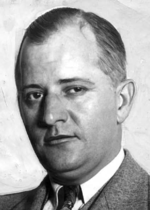Arthur Alber

Arhur Alber (born 1892-1964) was an attorney and a member of the Los Angeles, California, City Council from 1927 to 1929.
Biography
Alber was born September 16, 1892, in Birmingham, Alabama. His parents were Hermann Alber, a native of Germany, and Mary Wing of Cape Cod, Massachusetts. He attended the local public schools until he was fifteen, when he moved with his family to Los Angeles, where he enrolled in Hollywood High School. In 1910 he took the role of Shady in a student production of the operetta Pauline,[1] and during his high school years he played football, tennis and baseball; he was baseball team captain. He graduated in June 1912 and returned for Alumni Visitors Day in January 1913, when he gave a talk on Civil War Confederate General Robert E. Lee. Between 1914 and 1918 he attended the University of Southern California, where he earned letters in baseball and tennis.[2][3][4][5]
Sources differ as to his World War I service. A report from a telephone interview with a Works Progress Administration writer in 1937 noted that he "served in the Army at Vancouver, Washington, where he attended officers training school,"[2] but a 1926 article in the Los Angeles Times said: "Due to injuries resulting from an accident, Mr. Alber was unable to see active service with the army or navy during the World War, but served as a sergeant in the spruce woods."[6] Another 1926 story said he was discharged from the Army in March 1919 and that he was on the stadium committee of the Hollywood American Legion post.[7]
Alber earned a law degree from the University of Southern California and was admitted to the California State Bar on March 1, 1919. He was unmarried as of 1937. Alber was a Presbyterian, a Republican and a member of the Hollywood Athletic, Los Angeles Athletic, Lakeside Golf and Westport Beach clubs, as well as being a Kiwanian.[2][8][9] He died in December 1964.[10]
Political life
Alber was a candidate in 1926 for the 63rd Assembly District seat being vacated by Sidney T. Graves. Alber had the Times endorsement, but came in second to Clare Woolwine. The other candidates were Ernest E. Noon and Voltaire Perkins.[11][12]
Alber was elected to the Los Angeles City Council District 2 in the May 1927 primary election, ousting six-year incumbent Robert M. Allan by a vote of 4,980 to 2,399. It was said that Alber's victory was partly due to the voters' making a "clean sweep at the City Hall" of the council members allied with political boss Kent Kane Parrot.[13] The district at that time covered Hollywood south of Franklin Avenue or Hollywood Boulevard and north of Santa Monica Boulevard, including the Los Feliz district.[14][15]
In his council activity, he was known for introducing a resolution in July 1929 that would have prohibited the rolling down of the shirts of men's bathing suits to the waist line. Only he voted in favor, all the other councilmen being opposed.[16] He was also the lone holdout against a resolution that gave the city of Hawthorne permission to circulate a petition asking for consolidation with the city of Los Angeles, stating that L.A. "should not adopt children until it knows that it can provide for them."[17]
For the Christmas season, 1927, Alber presided over a council meeting wearing a silk hat from Paris, presented to him by Councilman Isaac F. Hughes, The Times explained:
The "high-hat" presentation was the result of the recent discussion over whether the members of the City Council should wear two-gallon hats, cutaway coats, striped trousers and spats as they take part in the Tournament of Roses parade at Pasadena on New Year's Day. During the debate Councilman Alber remarked that he did not have a tall hat, so yesterday he was presented with the silk hat by Councilman Hughes... Alber was hailed as the Mayor of Hollywood."[18]
Alber did not run for reelection in 1929 but returned to private law practice.
References
Access to the Los Angeles Times links may require the use of a library card.
- ↑ "Will Sing Operetta," Los Angeles Times, April 28, 1910, page II-12
- 1 2 3 Los Angeles Public Library reference file
- ↑ "Fine Settings at Hollywood," Los Angeles Times, June 20, 1912, page B-11
- ↑ "In the Public Schools," Los Angeles Times, January 5, 1913, page II-16
- ↑ "Former Sport Star to Enter Politics," Los Angeles Times, July 11, 1926, page A-4
- ↑ "Many Would Go to Legislature," Los Angeles Times, August 29, 1926, page 2
- ↑ "Arthur Alber in Race for State Assembly Seat," Los Angeles Times, July 8, 1926, page A-3
- ↑ "They Got Members," Los Angeles Times, October 25, 1924, page 8
- ↑ "Kiwanis Nine and Lions Mix on Diamond," Los Angeles Times, June 17, 1923, page I-9
- ↑ Social Security Death Index
- ↑ "How to Mark Your Ballot Next Tuesday," Los Angeles Times, August 29, 1926, page B-1
- ↑ "Election Returns," Los Angeles Times, September 3, 1926, page 1
- ↑ "The Watchman," Los Angeles Times, May 8, 1927, page B-5
- ↑ "First Map Showing City Council's Districts," Los Angeles Times, January 16, 1925, page 1 Includes a map.
- ↑ "Here Are the Hundred and Twelve Aspirants for the City's Fifteen Councilmanic Seats," Los Angeles Times, May 3, 1925, page 7 Includes a map.
- ↑ "Male Bathers Gain Victory," Los Angeles Times, July 12, 1929, page 5
- ↑ "Hawthorne Annexation Supported," Los Angeles Times, May 9, 1928, page A-1
- ↑ "Council 'High-Hats' Alber," Los Angeles Times,December 24, 1927, page A-11
| Preceded by Robert M. Allan |
Los Angeles City Council 2nd District 1927–29 |
Succeeded by Thomas F. Cooke |